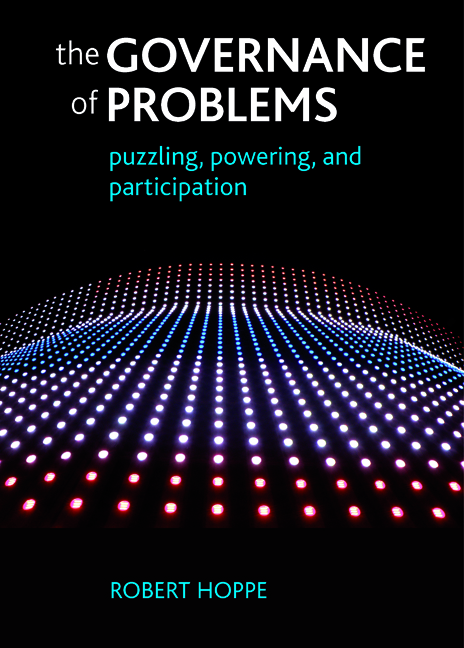Book contents
- Frontmatter
- Dedication
- Contents
- List of boxes, figures and tables
- About the author
- Preface
- one A problem-processing perspective on governance
- two The governance of problems: a map
- three Analysing policy problems: a problem-structuring approach
- four Cultures of public policy problems
- five Problem types and types of policy politics
- six Problem-structuring dynamics and meta-governance
- seven Making policy analysis doable and reflexive
- eight The plural democracies of problems: a meta-theory
- nine Public engagement and deliberative designs
- ten Responsible and hopeful governance of problems
- Bibliography
- Index
nine - Public engagement and deliberative designs
Published online by Cambridge University Press: 01 September 2022
- Frontmatter
- Dedication
- Contents
- List of boxes, figures and tables
- About the author
- Preface
- one A problem-processing perspective on governance
- two The governance of problems: a map
- three Analysing policy problems: a problem-structuring approach
- four Cultures of public policy problems
- five Problem types and types of policy politics
- six Problem-structuring dynamics and meta-governance
- seven Making policy analysis doable and reflexive
- eight The plural democracies of problems: a meta-theory
- nine Public engagement and deliberative designs
- ten Responsible and hopeful governance of problems
- Bibliography
- Index
Summary
Given its essentially intersubjective and dialectical character, political discourse and conduct are fundamentally to be measured … against the standard of whether they acknowledge and sustain the interrogative dialectic. Only an unremitting interrogative dialectic allows men, if not to achieve fixed truths, at least to slough off errors. (Dauenhauer, 1986: 34)
Introduction
Applied to political regimes or systems as a whole, the meta-theory of plural democracies of problems has strong normative and prescriptive implications. Any policy-making system ought to be sufficiently robust and flexible to encompass in its political repertoire all four problem-structuring approaches, types of policy networks, styles of doable policy analysis, and democracy types. To the extent they have, moreover, they also ought to be able to rebalance the weight of these four modes in accordance with the development of dominant problem framings. That is, governance systems ought to be capable of flexible shifts from rule and analysis/instruction learning, to negotiation, to accommodation and conflict management, to participatory and deliberative variety/selection learning. However, liberal democracies cannot handle all four different problem types equally well. In this chapter, the first section shows that especially unstructured problems tend to be neglected or approached the wrong way. The second section discusses whether and to what extent this type of democratic deficit may be remedied by gently nudging the political system and policy network to more deliberation-cum-participation by meta-governance or deliberate shifts in governance. Particularly, the third section discusses common problems in running deliberative-democratic experiments and the uptake of their outputs in normal, representative-democratic politics.
Wrong-problem problems
Type III errors
It was claimed in Chapter Eight that the meta-theory of democratic practice is descriptively adequate for democratic problem structuring and solving in many Western democracies. Nevertheless, this does not diminish its possibilities as a tool for assessment and potential improvements. This possibility is given with the concept of Type III errors, or wrong-problem problems (a concept introduced in Chapter Three), as structural or temporal mismatches between the effectively dominant governmental problem definition and alternative problem framings alive among other groups of citizens or stakeholders in society. In light of the previous discussion, such a mismatch may also be considered as allowing too little, or (in theory) too much, pluralism for successful problem coping.
- Type
- Chapter
- Information
- The Governance of ProblemsPuzzling, Powering and Participation, pp. 215 - 242Publisher: Bristol University PressPrint publication year: 2010

